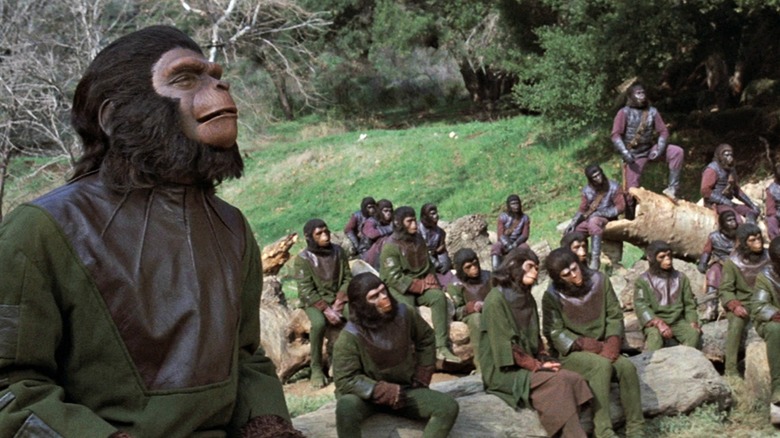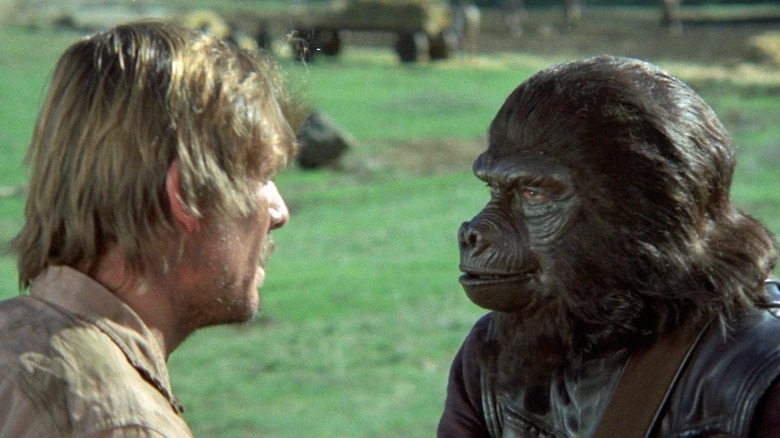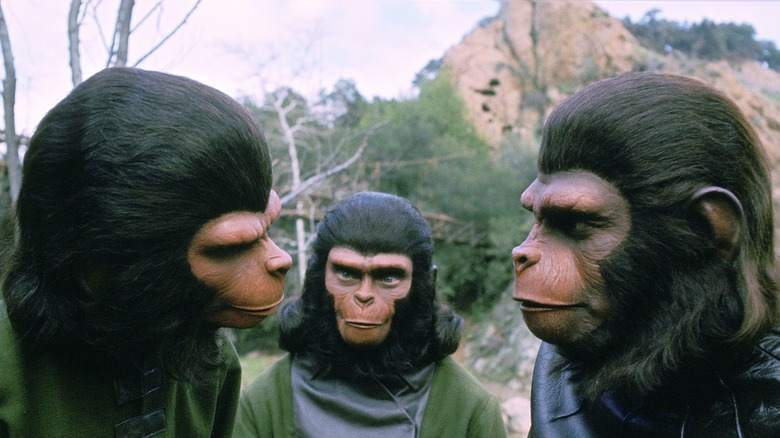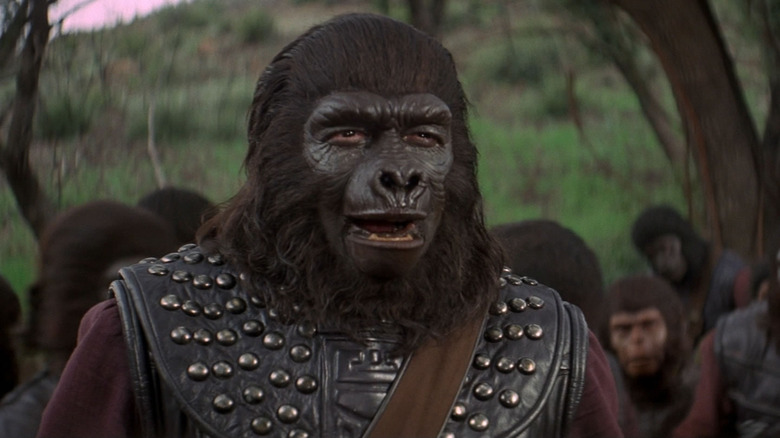One Planet Of The Apes Movie Has An Embarrassingly Low Rotten Tomatoes Score
As a brief prologue, we must remind ourselves how Rotten Tomatoes works. When a critic submits a written review to the RT aggregate, they are asked to deem that review either "fresh" or "rotten." The critic typically gets to make the distinction, meaning a 2.5-star review can be either positive or negative, based on who is submitting it. It's based on pass/fail grades. Rotten Tomatoes will then create a percentage of "positive" reviews. If 60% or more of the submitted reviews are positive, the film is deemed "fresh." If 59% or fewer are positive, it's "rotten."
If a film has, say, a 73% approval rating, it doesn't mean that every critic gave it a 73 out of 100. It only means that 73% of the submitted reviews are positive.
All that said, some films receive such low approval ratings that one might be able to draw some logical conclusions about the film being rated. A film with a 59% approval rating may easily be one that many critics consider among the best films of the year. A film with a 13% approval rating, however, isn't being well-received by critics in general.
All that said, the "Planet of the Apes" films have been wildly inconsistent with critics. There have been nine "Apes" films to date across three separate continuities, and only the 1968 original might be considered a stone-cold classic. Many of the others can be debated, including the largely celebrated CGI continuity that began in 2011.
One of the "Apes" movies, however, seems to be pretty universally reviled by critics and fans alike. One needn't have been a longtime "Apes" fan to know that J. Lee Thompson's 1973 entry "Battle for the Planet of the Apes" is the least-beloved of the series.
Wait... It's not the Tim Burton Film?
It may surprise some people that Tim Burton's 2001 remake of "Planet of the Apes" is not at the bottom of the series, critically speaking. When Burton's film was released, many bristled at its temerity to change the premise of Franklin Schaffner's original. Schaffner's film was about astronauts, led by Charlton Heston, who travel at sublight speeds for longer than anticipated, arriving on a distant planet (they assume) where humans are mute cavemen and apes are the dominant, language-bearing species. The infamous twist ending to "Planet of the Apes" is widely known. Burton's film saw the film's central astronaut, played by a terribly micast Mark Wahlberg, arriving on a planet where apes could indeed speak English, but where humans were enslaved instead of cavemen.
No matter what one thinks of Burton's film, one cannot deny that it looks amazing. The ape makeup is some of the best in cinema history. It currently holds a 44% approval rating based on 160 reviews. 70 critics gave it a pass.
No, the worst-rated film in the series was "Battle for the Planet of the Apes" from 1973, the fifth and final film in the original "Apes" continuity. "Battle" has a mere 36% approval rating based on 28 reviews. Only 10 critics gave it a pass. Roger Ebert was not one of them, speaking for most people when he wrote that "['Battle'] looks like the last gap of a dying series, a movie made simply to wring the dollars out of any remaining ape fans [...] Anyone who hasn't had enough apes after the first four in the series has probably, by now, gone ape all by himself."
Battle for the Planet of the Apes
The chronology of the first five "Apes" movies is a little confusing and inconsistent, but I shall try to explain. The original "Apes," as on-screen information explains, takes place in the year 3978. The computer readout declaring the year, however, could easily have been faulty, and Charlton Heston could just as easily have arrived many tens of thousands of years — or even millions of years — beyond that. The latter theory would have allowed Apes to evolve as much as they did. In the sequel, "Beneath the Planet of the Apes," however, the year was re-established as 3955, so there were clearly a few screenwriters who weren't paying attention. Notable: the Earth blows up at the end of "Beneath the Planet of the Apes."
The third film in the series, "Escape from the Planet of the Apes," takes place in 1973 thanks to a time warp. In that film, the intelligent ape characters (Kim Hunter and Roddy McDowell) are killed by a worried human fearing that their presence will kickstart the apocalypse from the previous movie. Only an infant chimp survives in secret. "Conquest of the Planet of the Apes" follows that surviving ape into the then-futuristic year of 1991. The ape child Caesar (also McDowell) leads an uprising of regular apes against humans.
In "Battle," it's not explained how the apes came to be intelligent, but by the early 21st century, when "Battle" is set, all apes can speak English. A nuclear bomb has wiped out most of humanity, the apes have survived, and humans have become their servants. Other sects of humans, afflicted by radiation burns, stand opposed to the apes, planning to attack and retake the scorched Earth.
Was this thing shot in a public park?
Anyone who knows about evolution is likely already squinting at the 3978 date put forth by the first "Apes" movie, but the idea that apes evolved into speaking, clothes-wearing hominids by, say, 2020 is simply absurd. At least in the 2011 continuity of "Apes" films, there was an evolutionary catalyst in the form of an intelligence-enhancing gas. There are no such gases in "Battle for the Planet of the Apes." We're simply meant to accept that Apes will become talking apes within a few decades.
In addition to the wild evilutionary conceits, "Battle" is incredibly cheap. It had the lowest budget of an "Apes" film yet — only $1.7 million — and it looked like it. The bulk of the film takes place in grassy outdoor areas, giving audiences the impression that it was shot, guerilla-style, in a public park. The messaging is also ridiculous. Caesar realizes, through a labyrinthine set of circumstances, that apes are just as violent and mean as their human counterparts. He declares that humans and apes should be equals and that war should hereby come to an end. He also, however, agrees to keep weapons in a storeroom just in case. One might think that if Caesar were truly devoted to pacifism, he'd destroy all the weapons and allow humans to evolve alongside the apes.
But we already know that humans will become subservient animals. Indeed, seeing humans serving apes in the 1968 original was that film's nightmarish appeal. It was a "through the looking glass" drama that transposed apes and humans. "Battle" undoes all that.
It's no wonder "Battle" has a low Rotten Tomatoes score. It's not very good.



